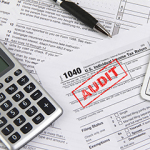April 12, 2017 | Court Rulings, Divorce Litigation, Valuations
Kminek-Nierenberg v. Kenneth Nierenberg, 2016 N.J. Super. Unpub. LEXIS 2015 (Sept. 8, 2016) A complex New Jersey divorce litigation with multiple defendants and several family businesses illustrates the challenges appraisers and the trial court faced in determining the appreciated value of numerous separate premarital and gifted assets for equitable distribution purposes. The case highlights basic Continue Reading »
April 10, 2017 | Accounting Standards, Fraud Prevention, IRS Regulation, Tax Planning, Tax Preparation
Before meeting with taxpayers and their professional representatives, IRS examiners usually do their homework. This includes reviewing any relevant Audit Techniques Guides (ATGs) that typically focus on a specific industry or audit-prone business transaction. ATGs are available to the public even though they are designed to help IRS examiners prepare for audits. So, small business Continue Reading »
April 7, 2017 | Financial Planning, IRS Regulation, Tax Planning, Tax Preparation
You must start taking mandatory annual withdrawals from your traditional IRAs once you turn age 70½. This includes any simplified employee pension (SEP) accounts and SIMPLE IRAs that you set up as a small business owner. These mandatory IRA payouts are called required minimum distributions (RMDs). And if you fail to take timely distributions there’s Continue Reading »
April 3, 2017 | Court Rulings, Deductions, Fraud Prevention, Tax Planning, Tax Preparation
Your personal losses resulting from casualties and thefts are allowed to be deducted by the tax law, within certain limits. And a “theft” for tax purposes isn’t strictly limited to house burglaries or stolen cars. However, as you will see from several U.S. Tax Court cases, the deduction can hinge on the application of state Continue Reading »
March 31, 2017 | Valuations
Traditional valuation models don’t necessarily work for Maine small businesses and professional practices. Public market data may be less relevant for a small business that functions primarily as a job or steady source of income its owner(s). Instead, business appraisers and brokers typically recommend using an alternate metric for appraising small businesses known as “seller’s discretionary Continue Reading »
March 29, 2017 | Court Rulings, Fraud Prevention, Valuations
MSKP Oak Grove, LLC v. Venuto, 2016 U.S. Dist. LEXIS 84950 (June 29, 2016) A recent fraud case illustrates how a thorough expert report can help an embattled valuator stay the course even in the tumult of litigation. The key is to document everything. Need for reverse engineering Four defendants sold their tanning salon franchise Continue Reading »
March 27, 2017 | Business Plans, Financial Planning, IRS Regulation, Tax Planning, Tax Preparation
You’re probably fed up with high self-employment (SE) tax bills if you own a profitable, unincorporated Maine business with your spouse. Typically, an unincorporated business in which both spouses are active is treated as a partnership that’s owned 50/50 by the spouses — or a limited liability company (LLC) that’s treated as a partnership for Continue Reading »
March 24, 2017 | Financial Planning, Tax Planning, Tax Preparation
Is a Simplified Employee Pension (SEP) right for your Maine small business? SEPs are stripped-down retirement plans intended for self-employed individuals and small businesses. Consider establishing a SEP if you don’t already have a tax-favored retirement plan set up for your business, and if you act quickly, you may be able to claim a deduction for Continue Reading »
March 20, 2017 | IRS Regulation, Tax Planning, Tax Preparation
This year, the IRS Whistleblower Office is celebrating its 10-year anniversary. The office was created under the Tax Relief and Health Care Act of 2006 to oversee the IRS whistleblower program, which is a critical part of overall enforcement and compliance. Informants have helped the IRS collect $3.4 billion in additional revenue since the program began. Continue Reading »
March 17, 2017 | Deductions, Financial Planning, IRS Regulation, Tax Planning, Tax Preparation
The Basics of Section 179 Deductions Under the Protecting Americans from Tax Hikes (PATH) Act of 2015, the Section 179 deduction for qualified real property expenses was made permanent. However, claiming this deduction isn’t a no-brainer. This article will explain some of the pros and cons. The Sec. 179 deduction allows you to write off qualified Continue Reading »










